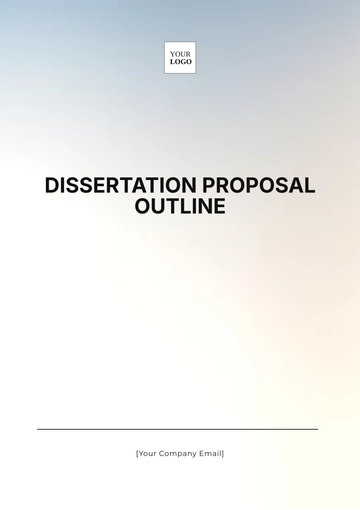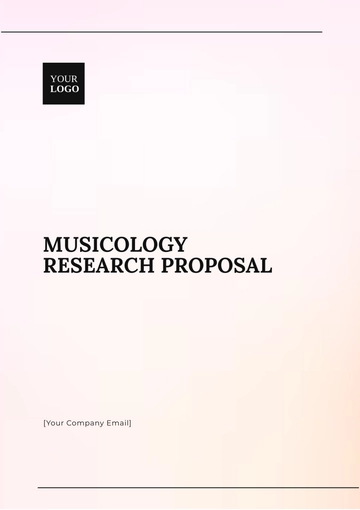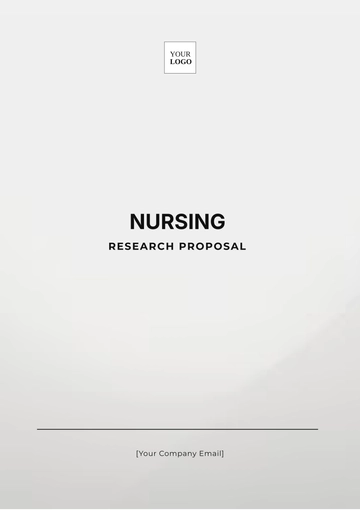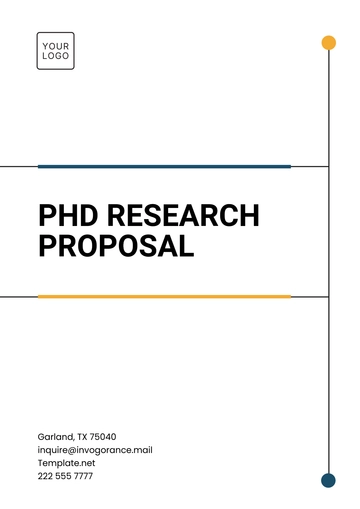Free Undergraduate Research Proposal

Abstract
This research investigates the influence of urban green spaces on the mental health of college students. The study will employ surveys and interviews to evaluate how access to green areas affects stress, anxiety, and overall well-being. By comparing students who have regular access to green spaces with those who do not, the research aims to provide insights into the psychological benefits of urban nature and offer recommendations for improving campus environments.
Introduction
Background: Urbanization has led to reduced exposure to natural environments, which can negatively impact mental health. College students, often under significant academic and social stress, may particularly benefit from increased access to green spaces.
Research Problem: How do urban green spaces affect the mental health of college students?
Research Objectives:
To assess the relationship between proximity to green spaces and mental health outcomes among college students.
To identify specific aspects of green spaces that contribute to improved psychological well-being.
Significance of the Study: The findings will inform campus planning and public health strategies, emphasizing the importance of integrating green spaces into university environments to enhance student well-being.
Literature Review
Previous research indicates that access to natural environments can reduce stress and improve mood. For example, Kaplan and Kaplan (1989) found that green spaces contribute to lower stress levels and improved cognitive functioning. However, many studies focus on general urban populations rather than specific groups such as college students. This research aims to fill this gap by examining how green spaces impact this particular demographic.
Research Objectives or Hypotheses
College students with regular access to urban green spaces will report lower levels of stress and anxiety compared to those with limited access.
Students who engage in activities within green spaces will experience greater improvements in mood and overall mental health.
Methodology
Research Design: A mixed-methods approach combining quantitative surveys and qualitative interviews.
Data Collection:
Surveys: Distributed to 200 college students at Springfield University, measuring stress levels, anxiety, and frequency of green space use.
Interviews: Conducted with 20 students from various campuses with different levels of green space availability to gain in-depth insights.
Data Analysis: Statistical analysis of survey data to identify correlations between green space access and mental health outcomes; thematic analysis of interview transcripts to explore qualitative insights.
Ethical Considerations: All participants will provide informed consent. Privacy will be maintained through anonymization of responses, and data will be stored securely.
Expected Outcomes
The study is expected to demonstrate a positive relationship between access to urban green spaces and improved mental health among college students. It is anticipated that students with better access to green areas will report lower stress and higher overall well-being. The research may lead to recommendations for increasing green space on campuses to support student mental health.
References
Kaplan, R., & Kaplan, S. (year). The Experience of Nature: A Psychological Perspective. Cambridge University Press.
Ulrich, R. S. (year). Viewing through a window may influence recovery from surgery. Science, 224(4647), 420-421.
Budget
Survey Tools: $200
Data Analysis Software: $150
Participant Incentives: $300
Travel Expenses: $100
Total: $750
Results and Conclusion
(Results and conclusions will be completed upon data collection and analysis.)
- 100% Customizable, free editor
- Access 1 Million+ Templates, photo’s & graphics
- Download or share as a template
- Click and replace photos, graphics, text, backgrounds
- Resize, crop, AI write & more
- Access advanced editor
Present your research ideas clearly with Template.net's editable Undergraduate Research Proposal Template. Customizable to fit any academic field, this template is designed for ease of use. Access our Ai Editor Tool for seamless editing and a polished final proposal.
You may also like
- Business Proposal
- Research Proposal
- Proposal Request
- Project Proposal
- Grant Proposal
- Photography Proposal
- Job Proposal
- Budget Proposal
- Marketing Proposal
- Branding Proposal
- Advertising Proposal
- Sales Proposal
- Startup Proposal
- Event Proposal
- Creative Proposal
- Restaurant Proposal
- Blank Proposal
- One Page Proposal
- Proposal Report
- IT Proposal
- Non Profit Proposal
- Training Proposal
- Construction Proposal
- School Proposal
- Cleaning Proposal
- Contract Proposal
- HR Proposal
- Travel Agency Proposal
- Small Business Proposal
- Investment Proposal
- Bid Proposal
- Retail Business Proposal
- Sponsorship Proposal
- Academic Proposal
- Partnership Proposal
- Work Proposal
- Agency Proposal
- University Proposal
- Accounting Proposal
- Real Estate Proposal
- Hotel Proposal
- Product Proposal
- Advertising Agency Proposal
- Development Proposal
- Loan Proposal
- Website Proposal
- Nursing Home Proposal
- Financial Proposal
- Salon Proposal
- Freelancer Proposal
- Funding Proposal
- Work from Home Proposal
- Company Proposal
- Consulting Proposal
- Educational Proposal
- Construction Bid Proposal
- Interior Design Proposal
- New Product Proposal
- Sports Proposal
- Corporate Proposal
- Food Proposal
- Property Proposal
- Maintenance Proposal
- Purchase Proposal
- Rental Proposal
- Recruitment Proposal
- Social Media Proposal
- Travel Proposal
- Trip Proposal
- Software Proposal
- Conference Proposal
- Graphic Design Proposal
- Law Firm Proposal
- Medical Proposal
- Music Proposal
- Pricing Proposal
- SEO Proposal
- Strategy Proposal
- Technical Proposal
- Coaching Proposal
- Ecommerce Proposal
- Fundraising Proposal
- Landscaping Proposal
- Charity Proposal
- Contractor Proposal
- Exhibition Proposal
- Art Proposal
- Mobile Proposal
- Equipment Proposal
- Student Proposal
- Engineering Proposal
- Business Proposal





























